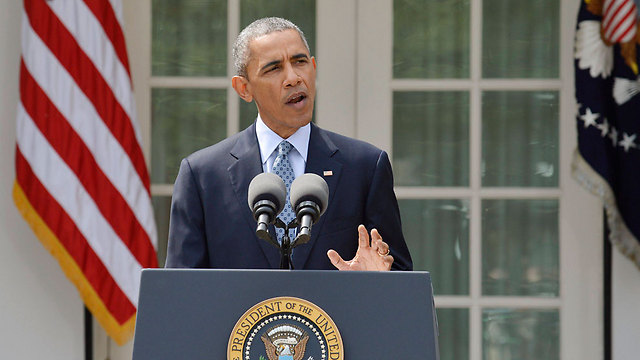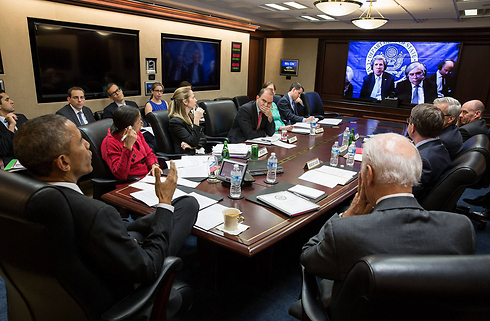Israel can't be happy with the framework agreement reached on Thursday night with Iran; no one in the world expects it to be happy. The agreement provides international legitimacy to Iran's status as a nuclear threshold state – and that's bad for Israel, bad for the Sunni states in the region, and bad for regional stability.
The agreement heralds the rehabilitation of the Iranian economy and the bolstering of the regime of the ayatollahs. The regime can continue to support terrorist organizations unhindered, to attack neighboring countries and preach the destruction of Israel.
The agreement has additional drawbacks that worry Israel: It's an invitation to a nuclear arms race, with Saudi Arabia, Turkey and maybe Egypt too seeking to become threshold states like Iran. Even if the Americans persuade these countries to wait, they will have to compensate them with the sale and supply of advanced weapons systems. The White House has already agreed to do so. This will give rise to justified Israeli concerns about losing its qualitative edge over its neighbors; and Israel will be forced to join the race.
"When you hear the inevitable critics of the deal sound off, ask them a simple question: Do you really think that this verifiable deal, if fully implemented backed by the world's powers, is a worse option than the risk of another war in the Middle East?" US President Barack Obama said in a speech from the White House Rose Garden on Thursday.
As Obama sees things, the alternatives – air strikes on the Iranian nuclear facilities and the start of a new war in the Middle East, or simply keeping the sanctions in place and thus allowing Iran to get the bomb – would lead to a far more dangerous reality. The agreement, Obama has stressed, doesn't rest on promises but on proof of implementation. Iran will be supervised and inspected like no other country ever before.
The address from the Rose Garden was as solid as a rock. It's safe to assume that Obama managed to convince most of his American listeners. I'm assuming, too, that most Israelis took a more wary view: In most instances, the Obama administration's moves in the region have ended in failure. They have demonstrated naiveté, weakness, a lack of understanding of the reality in the region, and constant fear of a military commitment.
Israelis are finding it hard to believe that Iran really will forgo its nuclear program. Israel, under similar circumstances, wouldn't; it would simply get smarter. Why would Iran behave any differently from us? It's hard to believe, too, that if Iran fails to abide by the agreement, the West will be in any hurry to re-impose sanctions on Tehran. Sanctions are easier to lift than to reinstate.
But it's time to stop fantasizing and to get back in touch with reality: Israel doesn't have a military option when it comes to destroying the Iranian nuclear program. And even if such an option existed in the past, it has expired. The United States won't bomb Iran; both US political parties are opposed to military action against Iran. The Republicans in Congress can attack Obama – that sounds good; but they have no desire to be held responsible for a new war. Under these circumstances, the details of the agreement that were published on Thursday are pleasantly surprising.
If US Secretary of State John Kerry is right, the agreement pushes the Iranian nuclear program back somewhat – so instead of two to three months until the first bomb, we're talking about a year or so. Iran is entering into a probation period that will last between 10 and 25 years. Parts of its nuclear program will be destroyed, others will be suspended. It's a whole lot better than the prophets of doom envisaged.
Benjamin Netanyahu placed the fight against the Iranian nuclear program at the top of his government's agenda. This fight, he said, is "the real life." Iran is Hitler's Germany; and an agreement with Iran is tantamount to the Munich Agreement. He hoped that Iran would cave and give up on the project, or collapse under the sanctions, or be brought to its knees by a US military operation.
None of that happened. And truth be told: Israel failed dismally. The more Netanyahu and Obama quarreled over the Iranian issue, the less influence Israel had on the talks and their outcome. The Americans didn't share any of the details with Israel. They also told their negotiation partners to beware of Israeli spying efforts. Netanyahu's Congress appearance may have stirred up voters in America and impressed voters in Israel, but Obama and Kerry refused to even blink.
The dilemma that Netanyahu is currently facing is no easy one. He could encourage the leaders of the Republican majority in Congress to thwart the agreement. Congress can, so it appears, insist on keeping the sanctions in place. Such a move would be unusual in US political tradition and involve various risks, but it is possible. It is doubtful whether such a move would achieve its objective.




















